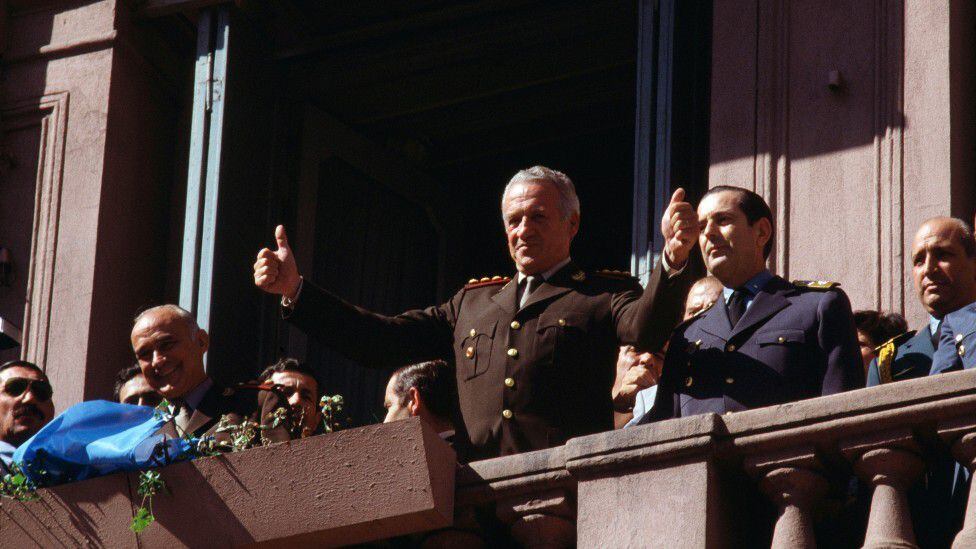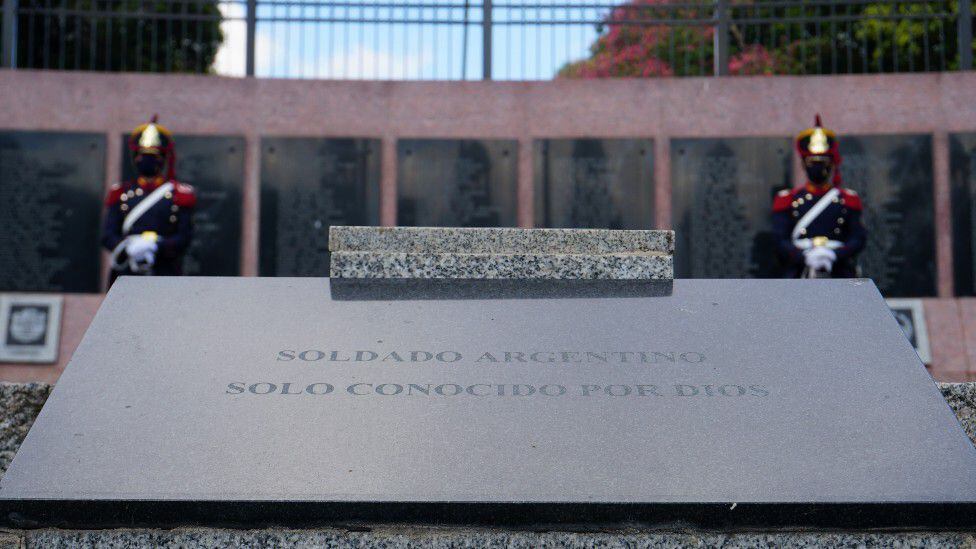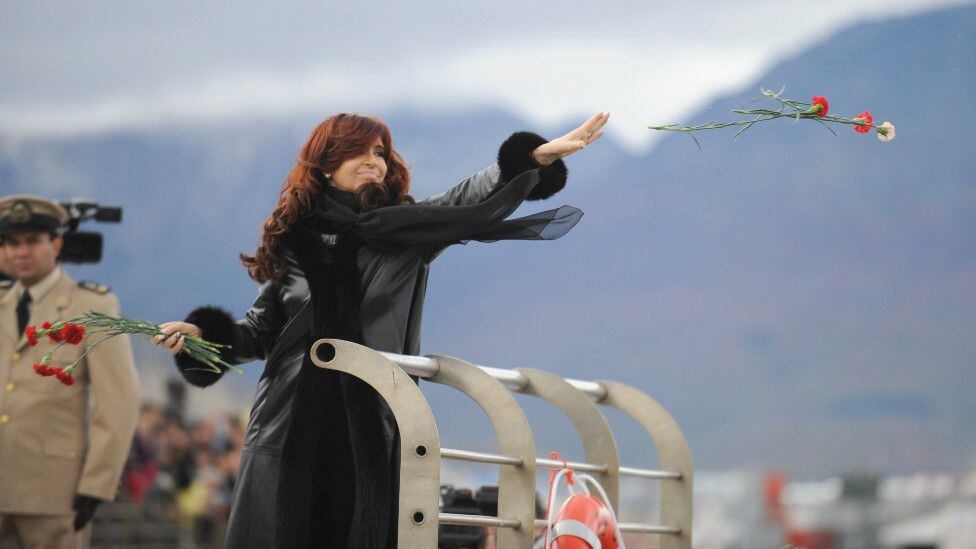Two days before the Argentine incursion into the Falkland/Malvinas Islandsthousands of people gathered in the emblematic Plaza de Mayo in Buenos Aires to protest against the military junta that ruled the country since 1976.
SIGHT: Fernández says that agreement with the IMF allows a “growth horizon” in Argentina
In that historic march was the current Argentine president, Alberto Fernandezwho was 22 years old at the time, was a judicial employee and was studying law.
“We were all very moved by that march and by what had happened”, he told BBC Mundo in an interview that he himself wanted to do at the Malvinas Museum in Buenos Aires, located on the grounds of the former Navy Mechanics School, a torture center during the military regime.
SIGHT: A German army reserve officer is charged with espionage for Russia
It is the first time that an Argentine president gives an interview to a British media about the Falklands/Malvinas.
“And suddenly it appeared on April 2, 1982 and we woke up (that) morning with the Argentina had occupied the Malvinas”, he added.
“It was a very shocking moment for all of us, because it was obviously a measure adopted by the dictatorship in the utmost secrecy and nobody knew exactly how it had happened, who had made that decision”, he recalled.
SIGHT: Russia – Ukraine war: Red Cross says it is not yet known if there will be an evacuation from Mariupol this Friday
So much was the uncertainty, he said, that many came to think that the incursion was agreed upon: “We speculate that it was a half-discussed topic, because England definitely did not pay attention to the Malvinas Islands at that time (…) Only then could it be understood that they did something of that type”.
As president, Fernández has followed the Argentine state policy of claiming sovereignty over the islands through diplomacy and in accordance with United Nations resolutions.
United Kingdom maintains that its control of the islands predates the arrival of Argentina and that the islanders have expressed their desire not to change their status. Therefore, they have refrained from negotiating with Buenos Aires.
The dispute over these islands already existed between the Spanish and the British in colonial times. Since its independence from Spain in the 19th century, Argentina considered them its own as part of the territory inherited from the colony. But Britain insisted on its sovereign rights on the grounds that the first settlement on the islands was British. And in 1833 he returned to occupy them.
Democracy, “the most valuable”
Many in Argentina consider that the defeat in the Malvinas/Falklands war was what allowed the military regime to end and democracy to be restored.
Asked about this, Fernández acknowledged that the war accelerated this process. But he assured that “the fall had already begun and in any case was precipitated as a result of the war”.
The war, he noted, “he did not have popular consensus and the people were not consulted (…) In any case, what he did was promote the recovery of the lands that had always been Argentine. The most later military reaction was from the United Kingdom”.
Contrary to what some in his country think, Fernández considered that the conflict did not bring “no positive effect” for Argentina.
“It was a war declared by a dictatorship that sent a generation of brave young people, heroes, to fight in situations of great inequality with the opponent. That is why our eternal memory and our eternal respect“, he claimed.
“Those who commanded the war were genocidal, but those who died in the Malvinas were heroes”, He remarked during another section of the interview.
However, Fernández recognized that the Argentine defeat brought an important change.
“After June 14, Argentines never wanted to think of a military man in government and all Argentines learned that democracy is the most valuable thing we have.“, said.
“No one ever went to knock on the door of a barracks”.
peaceful way
During the conversation with BBC Mundo, which lasted almost 40 minutes, Fernández confirmed that he is opposed to using force to impose his territorial claim.
“I am not someone who believes in wars. I am a naturally pacifist“, he claimed.
“Problems are solved through dialogue and finding points of agreement”, he added, criticizing the UK’s refusal to comply with a resolution approved by the United Nations in 1965, which urges both countries to sit down to discuss the sovereignty of the Malvinas/Falklands.
However, the Argentine president was adamant when it came to a theoretical negotiation, saying that, if there were one, the greatest sacrifice he would be willing to make is “sit down to talk with those who usurp my land to see if I can get it back”.
Fernández also rejected the possibility of negotiating a shared sovereignty of the Malvinas/Falklands, stating that his aspiration is that “Argentina has full sovereignty. are our lands”.
“It is as if you usurped a house of mine and then I had to discuss with you to see how we share the rights to the house. If you usurped it, you have no rights. And that is what happens in Malvinas“, summarized.
According to Fernández, the Argentine claim is based, among other things, on the fact that the archipelago is “a continuity” of the territory: a part of the Argentine continental shelf.
“It is absolutely incomprehensible to think that these islands, which are a continuation of our Andes, that at some point submerge and re-emerge and form these islands, that these islands belong to a territory other than Argentina“, said.
“In addition, we occupied them before the English usurped them in 1833. And since then we have been recrying out,” he said, referring to a historical argument that the UK rejects.
“If something is clear to me, the only thing that is clear to me is that English are not the Malvinas, that is clear to me”, said the Argentine president emphatically.

The future
Fernández believes that Argentina’s defeat in the war stopped the negotiations for the sovereignty of the Malvinas/Falklands.
“One of the United Kingdom’s arguments is that they have won the war and that has clearly postponed dialogue“, he claimed.
“But war does not give rights”, he opined.
He also confessed that he does not see it feasible for the British to sit down to talk.
“Frankly, I don’t see it, because the attitude of the United Kingdom is an attitude not only of not talking, but of advancing on the islands”, he accused.
“But just because you don’t see it possible doesn’t mean you give up trying. I will keep trying as many times as I can”.
The president assured that the Argentine claim is not based on the potential wealth that lies on the sea floor around the islands, which range from possible hydrocarbon deposits to large fish resources.
“Our claim does not come from the economic issue. Our claim comes because the memory of our dead does not let us live in peace“, he pointed.
However, he acknowledged thatIt is clear that there is wealth in the Malvinas and that wealth is lost by Argentina and exploited by England”.
“And therefore there is an economic consequence also on the exploitation of the sea, on the exploitation of oil, on the exploitation of the gas that exists in the entire maritime basin and also on the islands. That’s how it is”.

The rights of the islanders
In 2013, the islanders voted overwhelmingly (98.8%) in favor of remaining a British Overseas Territory.
After that referendum, the then British Prime Minister, David Cameron, called for the wishes of the islanders to be British to be respected.
“I think the most important thing about this result is that we believe in self-determination, and the islanders have spoken very clearly about their future, and now I hope that other countries around the world will respect and accept this clear result.”.
Fernández reiterated Argentina’s historical position of not including the islanders in potential negotiations.
“You usurp my house and I go to a judge, and the judge says let’s first ask the usurper what he thinks about his right to live in the usurped house. That is not like that”.
“In legal terms, that is nonsense, in ethical terms it is immoral”, he assured.
“Now, I understand: they are not the usurpers, they are perhaps their grandchildren. Well, they are human beings, they have lived there for a long time and they must be respected and their rights must be respected, which are not the rights of usurpers”, he nuanced.

“What are those rights?“, She was asked.
“Continue living on their land and continue exercising the citizen rights that Argentina gives its citizens, which are many and very broad.“, answered.
Although he rules out that the British agree to sit down to negotiate, Fernández assured that he is optimistic about the possibility that one day the Malvinas/Falklands will be recognized as Argentine.
“I believe that reason always wins and we are right“, said.
“We don’t even have the force, we don’t have the ocean liners, we don’t have the artillery, we don’t have the planes, we don’t have the nuclear weapons that the United Kingdom brought back then to circulate in the South Atlantic. But what we have is reason”.
“I have no doubt about that and I am sure that at some point reason will prevail.”.
Source: Elcomercio

:quality(75)/cloudfront-us-east-1.images.arcpublishing.com/elcomercio/GM2TCMRNGA2C2MBRKQYDAORTGU.jpg)





